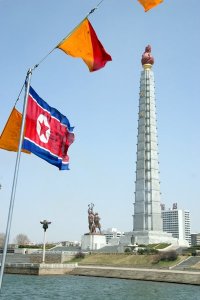Mounting Political Instability in North Korea
 Under Kim Jong-Un, who succeeded his father Kim Jong-Il in 2012, North Korea has experienced an extremely high level of internal and external instability. Adding on to the confusion, during this tumultuous period, the Kim regime has also displayed a renewed effort to build diplomatic relations. These mixed signals left DPRK observers confused as to whether the country was seeking conflict or peace.
Under Kim Jong-Un, who succeeded his father Kim Jong-Il in 2012, North Korea has experienced an extremely high level of internal and external instability. Adding on to the confusion, during this tumultuous period, the Kim regime has also displayed a renewed effort to build diplomatic relations. These mixed signals left DPRK observers confused as to whether the country was seeking conflict or peace.
The political instability of North Korea has been steadily mounting for the last two years. Despite drawing condemnation from global society, including its closest allies, China and Russia, North Korea went ahead with its third underground nuclear test in February 2013. South Korea bitterly protested this, and the resulting bilateral tensions led to a five-month temporary closure of Kaesong Industrial Complex, the symbol of economic cooperation between the two Koreas, from April to September 2013. In December 2013, Kim Jong-Un’s surprise purge of Jang Sung-Taek, the vice chair of the National Defense Commission and one of Kim’s key political guardians, shocked the world. As a pro-China official, Jang served as an active liaison between China and North Korea. The sudden purge further strained the Sino-DPRK relationship, which had already become markedly colder after the February nuclear test. After the purge, Choi Ryong-Hae rose to power and briefly replaced Jang as the No.2 member of the Kim’s cabinet, but he, too, was soon dismissed and replaced by Hwang Pyong-So.
Military and diplomatic acts of aggression also continued during this period. In May 2014, North Korean artillery fired at a South Korean ship patrolling the Northern Limit Line, the unofficial maritime border line which North Korea does not recognize. Earlier this year, two American journalists, Jeffrey Fowle and Matthew Miller, were charged by the North Korean government with “anti-state” crimes, for leaving a Bible in a restaurant in the port city of Chongjin and for ripping up his tourist visa, respectively. On September 6, Miller was sentenced to 6 years of hard labor in isolation. Given these developments, North Korea’s foreign relations seem to have taken a turn for the worse, with the new regime barricading itself away from global society.
Recently, however, North Korea has also shown willingness to be re-engaged in global diplomacy. On the last day of the 2014 Incheon Asian Games, four top-ranking North Korean officials flew to Seoul to attend the closing ceremony, which was unusual considering that there have been virtually no high-level bilateral visits in recent years due to heightened tensions. Among them were Choi Ryong-Hae, who had previously served as the Secretary of the Korean Workers’ Party and Director of of the Korean People’s Army General Political Department, as well as Hwang Pyong-So, who has been amassing political power as the de facto second-in-command of the North Korean regime. This triggered strong excitement amongst observers, who speculated that the real motive of the high-level DPRK delegation was to discuss substantive issues with South Korea, since they were considered “too important” for the Asian Games. The representatives discussed “a variety of issues in a friendly atmosphere,” with top South Korean ministers, and expressed their intention to have another meeting in the near future. Meanwhile, Ri Su-Yong, North Korea’s Minister for Foreign Affairs has been unusually active, choosing to personally represent North Korea at the 69th session of the United Nations General Assembly in New York, and visiting Iran and Russia to discuss economic cooperation and foreign investment. Considering that North Korea has not sent any top decision makers to the UN for the last 15 years, the recent moves may signify a great change in its diplomatic strategy.
The sudden storm of purges and dismissals are widely seen as part of Kim Jong-Un’s efforts to consolidate power as the new leader of the country, sweeping away remnants of his father’s rule and installing his own trusted lieutenants. At the same time, it is possible that North Korea has only just recognized the costs of its diplomatic isolation; international humanitarian aid for North Korea is now at the verge of suspension due to a lack of support, and the UN Human Rights Council established the Commission of Inquiry on Human Rights in the DPRK, which has published a damning account of human rights violations. Considering that North Korea is still pursuing its nuclear program, its renewed diplomatic interest may hint at a new attempt to restart nuclear negotiations, which have been deadlocked for years now. Amidst the many questions about Kim Jong-un’s recent mysterious disappearance from the public view, it is anyone’s guess what his next course of action will be .
